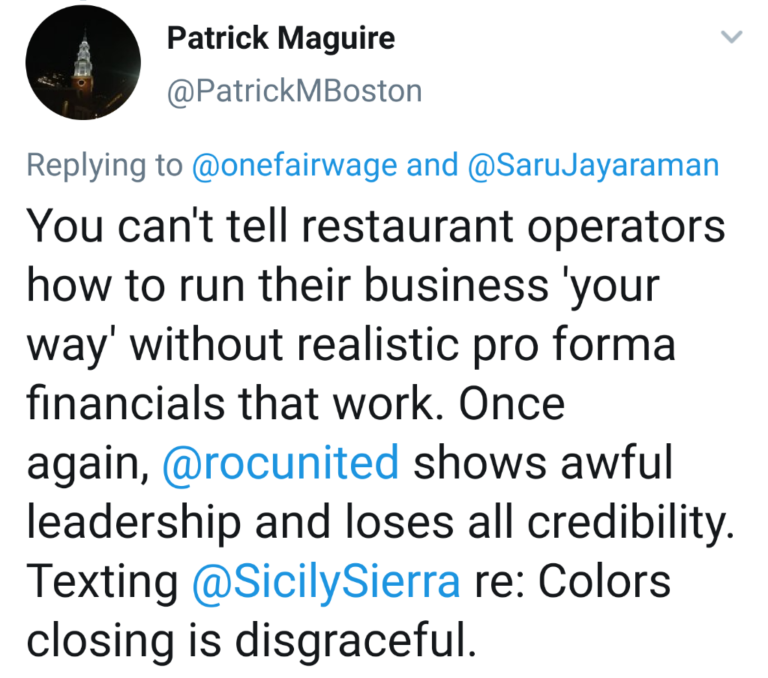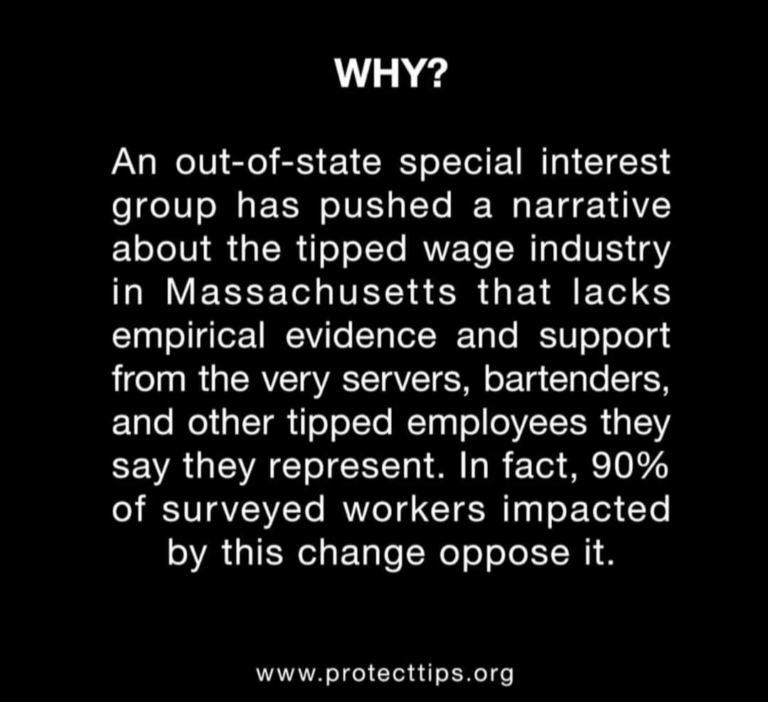Massachusetts – Vote NO on Ballot Question #5
By: Patrick Maguire
Book Chapter: Rules of Engagement
Posted: 11/2/2024
After extensive research and observation, I believe that Saru Jayaraman, founder of ‘One Fair Wage,'(OFW) is a self-serving, disingenuous fraud who has been manipulating and exploiting (emotionally and financially), the same workers that she claims to be advocating for. She has created a sustained cottage industry, an annuity for herself and Senior Director, Fekkak Mamdough funded by donations from many unsuspecting ‘charges’ under the guise of being their savior. Sound familiar?!?
Saru Jayaraman is the driving force behind the Question 5 ballot initiative in Massachusetts to eliminate the tipped minimum wage.
According to IRS Form 990 (non-profit tax form) for 2022, Saru’s total compensation was $137,162 and Fekkak was paid $119,726 from OFW donors and ‘dues paying’ members, including servers and bartenders. Total ‘salaries, other compensation, and employee benefits’ paid were $2,149,714 from Total Revenue of $5,639.169. I’ll report back when I learn what Saru and Fekkak are currently paying themselves 2 years later… (Please message me if you know.)
Speaking from decades of experience in jobs including dishwasher, bartender, server, manager, owner, and consultant to restaurants, the grind, high failure rates, and thin profits (if any), are very real in an extremely difficult business. Let’s not make it even harder to survive.
It’s counterintuitive to think that raising the tipped minimum wage will actually have a net, detrimental impact on the bottom line for workers. However, I believe that is exactly what will happen if Question 5 passes in Massachusetts, and it will threaten the viability of many of our favorite, independently owned, Mom & Pop, full service, neighborhood restaurants that we love.
So why is Saru a fraud?
Saru’s Colors restaurant in NYC was supposed to be a model for restaurant operators to take the ‘high road’and thrive. It failed, twice…
As I tweeted on January 20, 2022:

Here are some excerpts from a blog post I published on 1/22/20 titled: ‘ROC United Reveals True Colors in Wake of Abrupt Closure of Colors Restaurant in NYC.’
When your ‘socially conscious’ mantra is embracing the ‘high road,’ you don’t blindside the leader of your restaurant via text, ever, never mind only 3 days before closing your business for good. And exploiting and abusing the very people you claim to be advocating for, is even worse than the ‘low road.’ It’s the gutter.
From the official ROC (Restaurant Opportunities Center) website, now ‘One Fair Wage.’:
TAKING THE HIGH ROAD – A HOW-TO GUIDE FOR SUCCESSFUL RESTAURANT EMPLOYERS
What is the High Road?
Employers defined the “high road” as employment practices that support workers and unleash their loyalty, creativity, and productivity to make the restaurant successful. High-road employers emphasized that the benefits of increased productivity of invested long-term workers and the reduced cost of employee turnover outweigh the short-term costs of high-road practices.
While specific practices varied, these “high-road” policies fell into the following three areas:
1. providing livable wages
2. maintaining a healthy workplace through paid sick days, vacation, or health insurance; and
3. creating career ladders for employees through training and internal promotions policies
From early on, ROC United set themselves up to fail because the foundation they ‘built’ (I should say, ‘sold’) their business model and ideals on is fraudulent. They don’t practice what they preach and lead by example. With the shameful closing of Colors restaurant, they have zero credibility.
Shortly before Colors restaurant reopened after a 3-year closure, Eater NY reported, “It’s a comeback attempt for the 70-seat restaurant at 178 Stanton Street, between Clinton and Attorney streets. After the September 11 attacks, surviving Windows of the World employees regrouped and organized to build Restaurants Opportunity Center United, one of the country’s most important restaurant labor organizations. They also opened Colors, a restaurant intended to embody their ideals of fair pay, diversity, and employee equity. But while ROC and its advocacy took off, Colors never mastered the balance of running a profitable business with a nonprofit heart. Former employees have filed lawsuits, and many claimed that their fair wages weren’t paid on time.”
The 12/11/19 Eater piece also quoted Colors’ leader, Chef Sicily Sewell-Johnson just before the reopening:
Sewell-Johnson also is working to regain New Yorkers’ trust. “Colors did the community a disservice. We weren’t open for three years. We were inconsistent and let them down,” she says. “Then, among peers, ROC challenged the [industry’s] sub-minimum wage and tipping policies, but we weren’t co-laboring to make the changes. We have to repair those relationships to be taken seriously.”
There was no mention of Colors as a pop-up or “test drive.”
It’s ironic that the entity that prides itself as the standard-bearer of loyalty, equality, and trust betrayed one of their top leaders and advocates in a disgraceful fashion. They didn’t even have the intelligence and courage to meet with Sicily and her team in-person to tell them they were closing and why. And it gets worse…
Excerpts from Eater NY (1/21/20):
After only one month of service, the surviving Windows on the World employee restaurant Colors has closed yet again. Head chef Sicily Sewell-Johnson announced the closure Friday — saying that the restaurant’s owner, labor nonprofit Restaurant Opportunities Centers United, had suddenly pulled the plug.
And in another twist for the embattled restaurant, the chef tells Eater that ROC United is currently not letting her release the more than $2,000 that she raised over the weekend through Venmo to provide “a cushion” to staffers who have just lost their jobs. It’s another bump in what she says has been a “crazy” time with ROC, which she alleges has mismanaged the restaurant from the beginning.
“I’ll never look at this organization the same,” she says.
Management, though, was “a mess” from the beginning, she now says. Structures such as payroll, health insurance, and worker’s compensation were not in place, she says. Sewell-Johnson alleges that she sometimes paid vendors for food and other products out-of-pocket and filed for reimbursement, despite multiple requests for ROC to put a business debit card into place. When her finger got injured during business, she paid for care herself because the nonprofit never gave her health insurance that it had promised, she alleges.
Plus, ROC did not properly tell locals that Colors was open for business, Sewell-Johnson says. The restaurant was still showing up as closed on platforms such as Google and Yelp until the last week of business, she says.
“It was already a mess,” she says. “There were no systems. There was no structure.”
But business was also difficult because ROC did not seem committed to figuring out a financial plan that worked, she says. The nonprofit touted how it pays servers a $15 minimum wage plus tips, an extension of its ongoing fight to end the tipped minimum wage.
In practice, though, trying to pay $15 plus tips while creating an equitable pay structure throughout the restaurant created some bumps, Sewell-Johnson says. Because pooling tips is illegal, Colors also paid its kitchen staff above minimum wage. Entry-level positions like a dishwasher made $18.30 an hour, and with taxes, the restaurant ended up paying much more for labor than most restaurants in the city.
Sewell-Johnson wanted to start considering what other models would work, such as eliminating tipping, but she faced opposition from ROC. Ultimately, she says, paying a dishwasher a high wage doesn’t matter if the restaurant closes and the dishwasher can’t leave with additional skills.
“It’s easy for a lot of people to say — everyone deserves better, and this is what you should do,” she says. “It’s hard to find the middle to make that work.” [Amen.]
The New York Post, who broke the story on 1/19/20, quoted Sewel-Johnson, “…systems weren’t in place to make Colors succeed, when this place is the epitome of what ROC stands for.” BINGO. In other words, if you don’t practice what you preach, you have absolutely zero credibility. Remember, this comment is coming from a former ambassador of ROC.
The Post also stated, The chef said she was blindsided late Thursday when Sekou Siby, a former employee of Windows of the World and ROC’s executive director, informed her the plug was being pulled. Johnson was informed by Siby in a text that the eatery would close Sunday since funding could no longer be provided.
Reached by The Post for comment, Siby denied Sunday that the restaurant was closing, claiming the latest opening was always intended as a “test drive.”
“It’s not a closing, per se, but we are assessing the financial situation,” Siby said. “the last six weeks was a test drive, to analyze what is possible.” [Turns out, that was also bullshit…]
Back to Question 5 in MA. If an independent, Mom & Pop restaurant closes because they can’t survive the expenses imposed on them by a law created by a lobby group (who also failed attempting to operate a full service restaurant under the same model), the mission fails and everyone loses – the workers, the owners, and the ‘high road’ lobbyist. And the lobbying group refills their coffers with donations to sustain their ‘cottage industry’ and compensation and repeats the cycle of ‘advocacy.’
The current business model for full service, independent, Mom & Pop restaurants in America is far from perfect for workers and owners alike. And the issues are much more layered and complicated than the simplistic solutions bandied about on social media, “Be like Europe, NO Tipping!!” is a common refrain. Danny Meyer thought the US was ready to ‘disrupt’ the social contract of tipping in America when he eliminated tipping at his NYC restaurants and raised his prices to cover higher wages. The ‘movement’ didn’t work and Meyer abandoned the initiative.
On 5/3/18 I published: Saru Jayaraman, Fekkak Mamdouh, ROC United Leadership & Members: Is ONE FAIR WAGE really FAIR for All? Tip Credit & Tipped Minimum Wage-Part 1
Excerpt from that post:
Theoretically, philosophically, and morally there is rationale to support why the idea of eliminating tipping makes sense. However, the practical implications of imposing an experimental ‘solution’ on a culture unwilling to embrace the change will adversely impact the earnings of many servers, and simultaneously threaten the survival of independent, ‘Mom and Pop’ restaurants. For those reasons, I am going to propose that tipped minimum wages remain, and are set as a percentage of rising full minimum wage amounts. Further, I believe that the simplistic sounding, ONE FAIR WAGE ‘solution’ to the ‘living wage’ problem is far more complicated than ROC United and others make it sound. One size does not fit all. Legislation that might increase the pay for servers averaging $9/hr at a rural, national chain in the Midwest could simultaneously and significantly reduce the earnings of servers working at independent, full service restaurants in American cities where servers are earning a lot more than even ‘full’ minimum wage. I believe that we need to encourage local legislators to be more creative rather than imposing rigid, cookie cutter ‘solutions’ that just don’t work. I’d like to see ROC, NRA, RWA, RAISE Up (and other advocacy groups) consider a framework/compromise that is in the best interest of the diverse group of local workers, restaurants, and the customers they serve. We need more tiered solutions based on revenue, # of stores, # of employees, benefits provided, type of service, geography, median income, etc.
Shirley Leung, business reporter for the Boston Globe on 10/31/24:
“I just have one question about the ballot initiative to raise the minimum wage of tipped workers to $15 an hour: Why does it even matter what I think?
I don’t own a restaurant. I don’t own a salon. I don’t pretend to know how to run these businesses. So why do I, a random voter, get to tell these small business owners how they should pay their workers?
C’mon, this is not a good use of democracy.
We have to ask ourselves, how is it that, every election cycle, we allow special interest groups to make an end-run on our legislative process? We already have representative government. Voters cast ballots for the people we want to make policy decisions on our behalf.
A New York-based advocacy group, One Fair Wage, is pushing for the measure as part of a national campaign to change how tipped workers are paid. The proposal would get rid of the $6.75-an-hour minimum wage currently in place for tipped workers in Massachusetts, such as servers, bartenders, hairdressers, and manicurists, and replace it with the state’s standard $15-an-hour minimum wage.
I’m voting no on Question 5 because I don’t think many workers even want this. The concept is particularly perilous at restaurants, where it pits front-of-the-house workers, who are tipped, against the back-of-the-house workers who typically are not. Caught in the middle are restaurant owners who say it will drive up costs, forcing them to raise prices and reduce staff so they won’t go broke trying to comply with the law.
Proponents of Question 5 argue the measure will create a more equitable pay structure. The matter, they say, is about standing up for worker rights. And voters have to because the people who will benefit the most — lower-paid workers, many of them immigrants, from busboys to dishwashers — are too vulnerable to speak up.
I maintain it’s a bad idea to apply a one-size-fits-all approach to sectors that are still recovering from the turmoil of the pandemic and its aftermath.
And too often, ballot questions make convincing campaign rhetoric but terrible law. A similar measure to boost wages of tipped workers was passed by voters in Portland, Maine, in 2016, but was undone a year later by the state legislature.”
I have read as much as possible from ‘all sides’ of the Question 5 debate. Thoughtful, sustainable solutions to the restaurant industry’s problems are going to require much more significant study and collaboration by everyone impacted, not half-assed, self-serving solutions. This legislation is misguided.
#NoOnQuestion5



Leave a Reply
Permalink | Posted in Rules of Engagement | No Comments »


